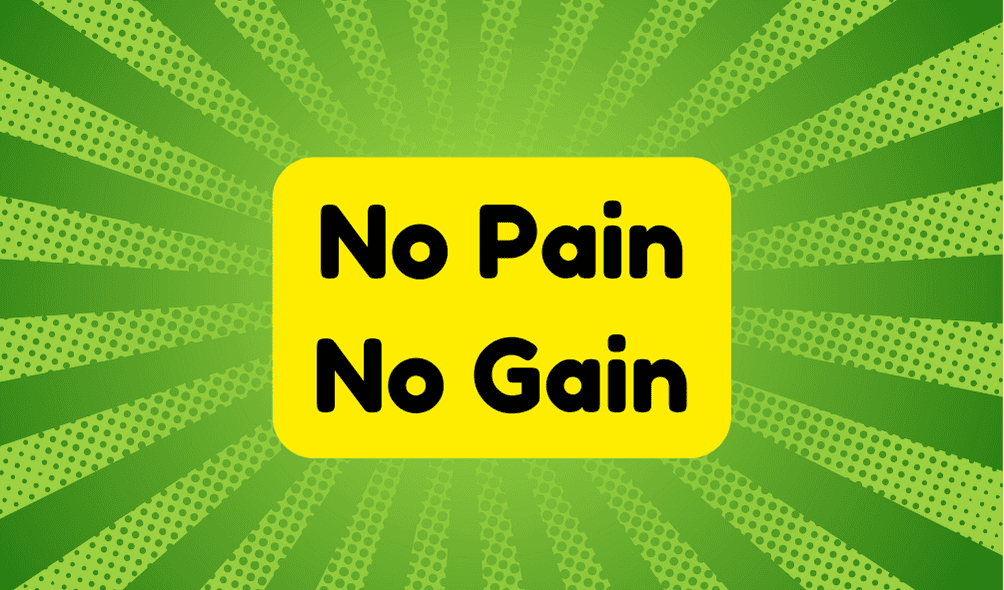The phrase "No Pain, No Gain" suggests that hard work and suffering are essential for achieving success. While it's true that significant effort often yields rewarding results, this mindset can be misleading. It downplays the importance of balance and self-care. Intense labor, like grueling workouts, can lead to gains, but it can also result in injury or burnout if taken too far. Remember, struggling isn't the only path to improvement; smart training and rest matter too. Understanding these complexities can help you navigate your own journey toward success. You'll discover more insights that challenge this longstanding notion.
Synonyms
When thinking about the phrase "No pain, no gain," several synonyms come to mind that capture its essence. You might find these phrases resonate with the idea that effort rewards come from enduring challenges. But let's be realistic: embracing suffering doesn't magically lead to growth without a strategy. Here are some phrases that reflect this sentiment:
- Hard work pays off.
- Suffering leads to success.
- Improvement demands effort.
- Without struggle, there's no achievement.
- Intense labor yields results.
These synonyms serve as reminders that real progress requires input and acceptance of discomfort. However, it's essential to approach this mindset with a balanced perspective. Effort is important, but clever planning and self-care are equally significant for sustainable growth.
Example of Sentences
Embracing the philosophy of "No pain, no gain" finds its way into everyday conversations, especially in the context of training and personal development. You might hear motivational phrases illustrating this idea:
- Winning the title demands extra training hours. "No pain, no gain."
- Encouragement pushes you through discomfort. "No pain, no gain."
- A 12-hour workday proves vital for success. "No pain, no gain."
- Marathon training requires painful runs. "No pain, no gain."
- Top athletes embody the philosophy of enduring pain for results.
While this fitness philosophy promotes resilience, it also raises questions. Is it always necessary to suffer for success? Striking a balance between effort and self-care is essential, ensuring you engage in meaningful growth without sacrificing your well-being.
Origin
The origin of the phrase "No pain, no gain" can be traced back to ancient wisdom, emphasizing the necessity of effort for achievement. In its historical context, it first appeared in the 2nd century within "The Ethics of the Fathers." Over the years, literary references helped solidify its status, including Robert Herrick's 1650 line "No Pains, No Gains," and John Ray's mention in 1670: "Without pains, no gains." Benjamin Franklin later rephrased it in 1758, saying, "There are no gains without pains." While the phrase gained popularity through Jane Fonda's exercise videos in the 1980s, it's crucial to question if pain is genuinely required for success or if innovative approaches could yield equally impressive results without the struggle.
Collocations
Building on the rich historical context of "No pain, no gain," it's important to explore how this phrase pairs with specific words and concepts, often referred to as collocations. These combinations emphasize that real effort rewards often come from enduring challenges and training discomfort.
Consider these common collocations:
- Embrace effort rewards
- Endure training discomfort
- Push through struggles
- Seek greater gains
- Commit to improvement
While it's easy to romanticize the idea of toughing it out, remember that not every struggle leads to success. Critical thinking is essential—evaluate whether your efforts align with your specific goals. Ultimately, understanding these collocations can sharpen your approach to achieving well-deserved rewards through hard work.
How to Use in Everyday Language
Often, people find themselves facing challenges that require extra effort to overcome. In your daily life, applying the phrase "No pain, no gain" means recognizing that achieving your goals often takes hard work. For everyday motivation, remind yourself that effort reward comes from pushing through discomfort and persistently tackling obstacles. When feeling lazy or stuck, use this mindset to reignite your drive. It could be sticking to a workout routine or taking on a tough project at school. Instead of avoiding the hard stuff, embrace it; this philosophy can lead to real growth and success. Skepticism is healthy, but remember, without putting in the effort, you'll find it tough to reap the benefits you desire.
Why Is It Still Relevant Today?
In today's fast-paced world, the principle of "no pain, no gain" remains as essential as ever. This mantra isn't just a catchy phrase; it carries significant cultural significance, motivating many to endure hardship for personal growth. While it's easy to dismiss this idea as outdated in an era focused on quick wins, consider how much effort goes into real achievement. Whether you're training for a marathon or pushing through a challenging job, you'll find that discomfort often accompanies meaningful progress. Embracing discomfort can ignite innovation and build resilience. Sure, it's tempting to seek shortcuts, but remember: authentic success typically requires hard work and dedication. In a world craving rapid results, the right balance of effort and patience is vital for lasting change.







